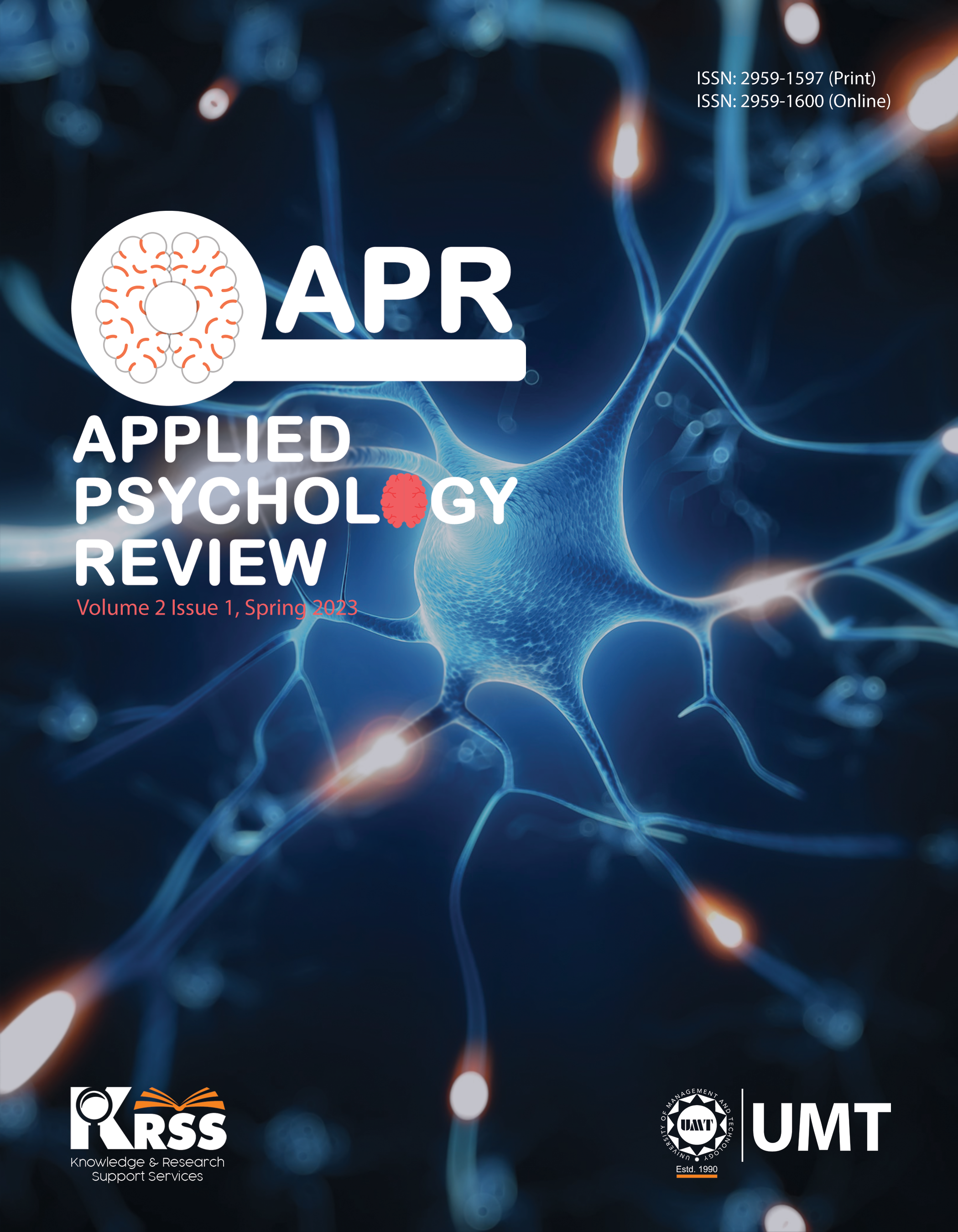Self-Esteem and Scholarly Accomplishment amongst Undergraduate Students
Abstract
 Abstract Views: 0
Abstract Views: 0
The main objective of this research is to find the relationship between self-esteem and academic accomplishment. We investigated if self-esteem plays a role in the academic achievement of students. Second, we investigate the effect of permanent residence, whether rural or urban, on the development of self-esteem. Furthermore, we checked whether economic status plays any role in developing self-esteem or not. For this, we collected data from 400 students of a public university in Islamabad, Pakistan. We collected data from men using the Rosenberg Self-Esteem Scale. After data collection, it was analyzed using SPSS version 23. Through the Pearson correlation, data revealed a significant positive relationship between self-esteem and the academic performance of students. However, this association was weak. This proves that high self-esteem helps students in achieving higher grades and vice versa. In the second hypothesis, researchers revealed a positive relationship between self-esteem and family monthly income that was deemed non-significant. To analyze the third hypothesis researchers checked whether self-esteem is high in rural students or in urban ones. However, he found that the area of belonging does not play any part in the self-esteem of students. Results came out non-significant here as well (p > .05 which was = .545). The current study is effective for students, parents and teachers because they will know after studying this article that academic performance is not a single variable that does not have any link with other variables. They will find out from the study that if we want high academic performance from students or children, we need to work on their self-esteem which would directly affect their academic performance.
Downloads
References
Akinleke, O. W. (2012). An investigation of the relationship between test anxiety, self-esteem and academic performance among polytechnic students in Nigeria. International Journal of Computer Applications, 51(1), 47-50. http://dx.doi.org/10.5120/8010-1376
Alam, M. M. (2013). A study of test anxiety, self-esteem and academic performance among adolescents. The IUP Journal of Organizational Behavior, 12(4), 33-43.
Alves-Martins, M., Peixoto, F., Gouveia-Pereira, M., Amaral, V., & Pedro, I. (2002). Self-esteem and academic achievement among adolescents. Educational Psychology, 22(1), 51–62. https://doi.org/10.1080/01443410120101242
Arshad, M., Zaidi, S. M. I. H., & Mahmood, K. (2015). Self-esteem & academic performance among university students. Journal of Education and Practice, 6(1), 156-162.
Filippello, P., Sorrenti, L., Larcan, R., & Rizzo, A. (2013). Academic underachievement, self-esteem and self-efficacy in decision making. Mediterranean Journal of Clinical Psychology, 1. 2282-1619. http://dx.doi.org/10.6092/2282-1619/2013.1.934
Guban-Caisido, D. A. D. (2020). Self-esteem and language learning: Empirical evidences from the past two decades. Journal of Teaching & Learning English in Multicultural Contexts, 4(2), 95-106.
Haq, M. A. (2016). Association between socio-demographic background and self-esteem of university students. Psychiatric Quarterly, 87(4), 755-762. https://doi.org/10.1007/s11126-016-9423-5
Hosseini, S. N., Mirzaei Alavijeh, M., Karami Matin, B., Hamzeh, B., Ashtarian, H., & Jalilian, F. (2016). Locus of control or self-esteem; Which one is the best predictor of academic achievement in Iranian college students. Iranian Journal of Psychiatry and Behavioral Sciences, 10(1), e2602. https://doi.org/10.17795/ijpbs-2602
Iniama, E. (2004). The relationship between self-esteem and academic performance of freshman at the University of the Virgin Islands [Paper presentation]. Annual Conference of the Caribbean Studies Association. Saint Kitts.
Jirdehi, M. M., Asgari, F., Tabari, R., & Leyli, E. K. (2018). Study the relationship between medical sciences students' self-esteem and academic achievement of Guilan University of Medical Sciences. Journal of Education and Health Promotion, 7, 52. https://doi.org/10.4103/jehp.jehp_136_17
Naderi, H., Abdullah, R., Hamid, T. A., Jamaluddin, S., Kumar, V. (2009). Self-esteem, gender and academic achievement of undergraduate students. American Journal of Scientific Research, 3, 26-37.
Nagar, S., Sharma, S., & Chopra, G. (2008). Self-esteem among rural adolescent girls in Kangra district of Himachal Pradesh. The Anthropologist, 10(2), 151-154. http://dx.doi.org/10.17265/2159-5542/2019.04.005
Neroni, J., Meijs, C., Kirschner, P., Xu, K. M., & de Groot, R. H. M. (2022). Academic self-efficacy, self-esteem, and grit in higher online education: Consistency of interests predicts academic success. Social Psychology of Education, 25(4), 1-25. http://dx.doi.org/10.1007/s11218-022-09696-5
Peixoto, F., & Almeida, L. S. (2010). Self-concept, self-esteem and academic achievement: Strategies for maintaining self-esteem in students experiencing academic failure. European Journal of Psychology of Education, 25(2), 157–175. https://doi.org/10.1007/s10212-010-0011-z
Rahmani, P. (2011). The relationship between self-esteem, achievement goals and academic achievement among the primary school students. Procedia-Social and Behavioral Sciences, 29, 803-808. https://doi.org/10.1016/j.sbspro.2011.11.308
Raskauskas, J., Rubiano, S., Offen, I., & Wayland, A. K. (2015). Do social self-efficacy and self-esteem moderate the relationship between peer victimization and academic performance? Social Psychology of Education: An International Journal, 18(2), 297–314. https://doi.org/10.1007/s11218-015-9292-z
Rosenberg, M. (1965). Society and the adolescent self-image. Princeton University Press.
Rosli, Y., Othman, H., Ishak, I., Lubis, S. H., Saat, N. Z. M., & Omar, B. (2012). Self-esteem and academic performance relationship amongst the second year undergraduate students of university Kebangsaan Malaysia, Kuala Lumpur campus. Procedia-Social and Behavioral Sciences, 60, 582–589. https://doi.org/10.1016/j.sbspro.2012.09.426
Sahranavard, M., & Hassan, S. A. (2012). The relationship between self-concept, self-efficacy, self-esteem, anxiety and science performance among Iranian students. Middle East Journal of Scientific Research, 12(9), 1190-1196. http://dx.doi.org/10.5829/idosi.mejsr.2012.12.9.356
Schmidt, J. A., & Padilla, B. (2003). Self-esteem and family challenge: An investigation of their effects on achievement. Journal of Youth and Adolescence, 32(1), 37–46. https://doi.org/10.1023/A:1021080323230
Utami, B. R., & Wahyudin, A. Y. (2022). Does self-esteem influence student English proficiency test scores? Journal of English Language Teaching and Learning, 3(2), 16-20.
Zheng, L. R., Atherton, O. E., Trzesniewski, K., & Robins, R. W. (2020). Are self-esteem and academic achievement reciprocally related? Findings from a longitudinal study of Mexican-origin youth. Journal of Personality, 88(6), 1058–1074. https://doi.org/10.1111/jopy.12550
Copyright (c) 2023 Owais Ahmad, Shamsa Siddiq

This work is licensed under a Creative Commons Attribution 4.0 International License.




